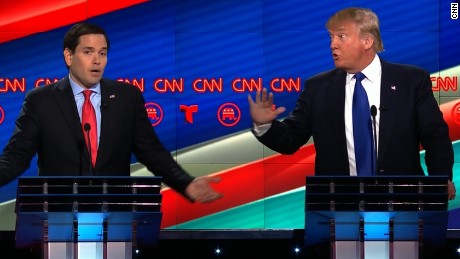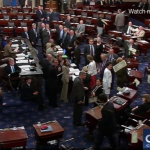As Donald Trump stands at the threshold of an overwhelming string of victories in today’s Super Tuesday contests, which could put him in the campaign category of unstoppable, panicked Republicans envision the unraveling of the GOP.
After months of denial, party leaders now concede that Trump is likely to emerge as the Republican nominee for the presidency. And they also fear that losing the White House and the Senate in the fall with Trump at the top of the ticket could make 2016 the tipping point when the party becomes unglued, splitting into rival factions.
The ramifications of a Trump nomination would be “huge and catastrophic,” warns Peter Wehner, who served in the administrations of Ronald Reagan, George H.W. Bush and George W. Bush. “This would be an epic political moment because it would be the fundamental redefinition of a great political party. It would, in many ways, be a dismantling of it.”
Wehner told The Hill that he is adamant that he would not support Trump in a general election, even against Democrat Hillary Clinton.
“I am not going to vote for Trump under any circumstances,” Wehner said. “I see him as an existential threat … a threat to America and the Republican Party and conservatism unlike anything I have ever seen.”
Trump supporters viewed as traitors, ‘collaborators’
As some Republicans in Congress – four House members and one senator – jump on the Trump bandwagon and others vow simply to “support the nominee,” party elders retch at Trump’s recent statements that he favors limiting the 1st Amendment’s free speech rights. Worse yet, on Sunday he three times declined to repudiate the KKK.
Those who have endorsed Trump, particularly New Jersey Gov. Chris Christie, are labeled as traitors by some Republicans. They’re seen as shallow, shameless, spineless.
As Trump gets closer to inevitability, the indignation becomes more apparent:
“This is a man utterly unfit to be president of the United States and nobody should be pretending otherwise,” said Eliot Cohen, a professor at Johns Hopkins School of Advanced International Studies, in an interview with The Hill. Cohen worked in the State Department during George W. Bush’s administration and was a special adviser on foreign policy to Romney during the 2012 campaign.
Of Trump’s candidacy in general, Cohen added, “It’s just dreadful. And I should be clear, I am a Republican. It’s extremely painful.”
Asked about the Christie endorsement, in particular, Wehner said, “I thought it was shameful — just unbelievably shameful. … It was sheer political opportunism.”
A last-ditch plan to derail Trump
At the same time, some prominent conservatives still see hope that the real estate mogul can be stopped, according to Politico.
“Trump is a terrible problem for the party: Lose the presidency to Hillary, lose the Senate and therefore the Supreme Court,” said David McIntosh, president of the Club for Growth, which has spent $3.5 million to deflate the Trump campaign. “What I’m sharing with the donors now is: Now’s the time. Super Tuesday and March 15 are when it becomes real, winner take all.”
McIntosh called on GOP senators who’ve remained on the sidelines — only 16 of 54 Republicans are endorsing a presidential candidate who is still in the race — to summon their home-state fundraising networks and supporter-lists to sink Trump.
At the National Review, which has also spent months blasting away at the Trump phenomenon, Sen. Marco Rubio’s sharp barbs aimed at the billionaire businessman in the last debate did not impress veteran columnist George Will:
Unfortunately, Rubio recognized reality and found his voice 254 days after Trump’s scabrous announcement of his candidacy to rescue America from Mexican rapists. And 222 days after Trump disparaged John McCain’s war service (“I like people that weren’t captured”). And 95 days after Trump said that maybe a protester at his rally “should have been roughed up.” And 95 days after Trump re-tweeted that 81 percent of white murder victims are killed by blacks. (Eighty-two percent are killed by whites.) And 94 days after Trump said he supports torture “even if it doesn’t work.” And 79 days after Trump said he might have approved the internment of Japanese Americans during World War II. And 72 days after Trump proved that he does not know the nuclear triad from the Nutcracker ballet. And 70 days after Trump, having been praised by Vladimir Putin, reciprocated by praising the Russian murderer and dictator. And so on.
We’re about to learn much about GOP leaders
Will added this:
… We are about to learn much about Republican officeholders who are now deciding whether to come to terms with Trump, and with the shattering of their party as a vessel of conservatism. Trump’s collaborators, like the remarkably plastic Chris Christie (“I don’t think [Trump’s] temperament is suited for [the presidency]”), will find that nothing will redeem the reputations they will ruin by placing their opportunism in the service of his demagogic cynicism and anti-constitutional authoritarianism.
The use of the term collaborators is certainly a reference to Trump’s penchant for authoritarian views that some equate to fascism.
The Union Leader, New Hampshire’s premier newspaper, went so far as to apologize for their prior endorsement of Christie, the former presidential contender, following his cowardly conversion to a Trumpster. “Watching Christie kiss the Donald’s ring this weekend — and make excuses for the man Christie himself had said was unfit for the presidency — demonstrated how wrong we were. Rather than standing up to the bully, Christie bent his knee. In doing so, he rejected the very principles of his campaign that attracted our support,” the newspaper said in an editorial.
Putting Obama genie back in bottle
At Vox, Matthew Iglesias writes that Republicans failed to stop Trump because they failed to understand his appeal:
Marco Rubio’s newly aggressive posture toward Donald Trump is all about delivering low-blow insults, and reflects a popular — but incorrect — notion among Republican elites that Trump’s not-very-orthodox ideology is succeeding because of the force of his personality. But Trump isn’t winning because he’s a buffoon. If anything, he is winning despite being a buffoon. He is winning because he understands that nationalism is more important to real-world conservative politics than free market dogma, and he offers what conservatives care about: a populist nationalism that is inflected with conservative policy commitments but by no means limited to them.
Trump is winning because he understands that the 2016 race is about the very definition of America itself. For candidates like Rubio — following the pace set by Barack Obama and Hillary Clinton — it’s about embracing a new, more diverse, more tolerant country. For Trumpers, it’s precisely the opposite. They want to put the Obama genie back in the bottle and fight vigorously for the traditional notion of Americanness, at home and abroad, even if it means jettisoning some of the GOP donor class’s ideological bugaboos.









